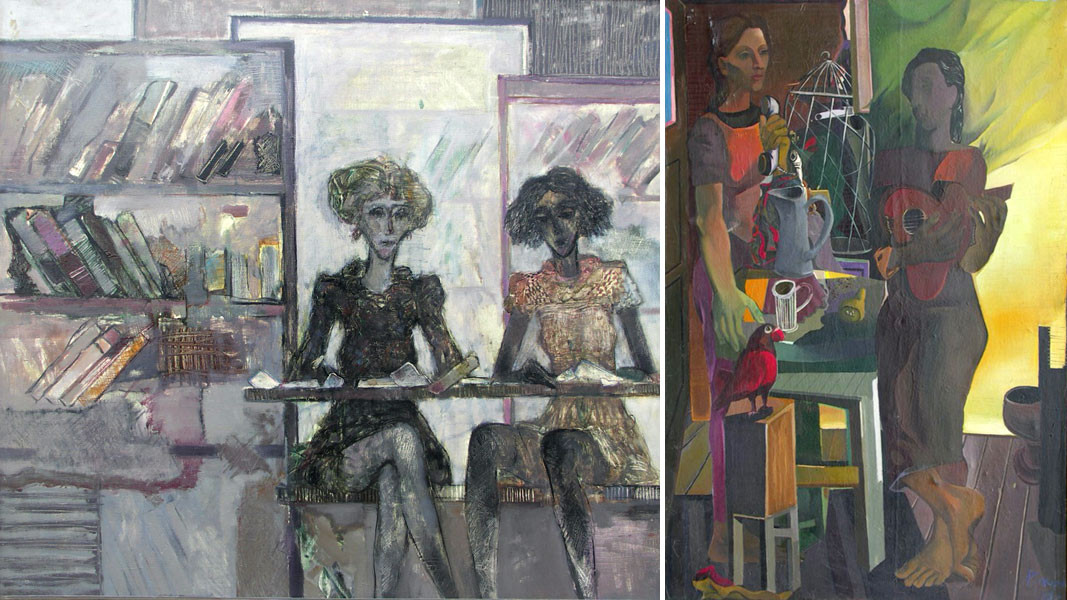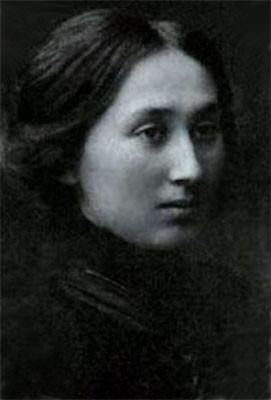In the month of March, the month of the Annunciation and the coming of spring, the ancient Seryakov house in Troyan is hosting an exhibition of 27 portraits of women with different life roles, different faces, different destinies.
The house where Georgi Seryakov (Gio) once lived – a follower of revolutionary Hristo Botev – now an art gallery, is opening doors today to the public, to present women in paintings by renowned artists from the fund of the Museum of Traditional Crafts and Applied Art in Troyan. The painters include names like Ivan Filchev, Teofan Sokerov, Ivan Peevski, Grigor Parvev, Vladimir Kirov.
“What all of the women in the portraits have in common is that they were an inspiration to the authors of the paintings,” says curator Mariela Shoshkova. “The other thing is that these are all paintings that have never been shown to the public before. And last but not least – they were all painted by foremost artists and are works any gallery in the country would be proud to have on its walls.”

In these portraits the artists have not painted familiar faces, they are more like a collective depiction of woman – a cherished memory, a dream, an eternal inspiration.

“Each one of the paintings deserved a separate conversation,” says Mariela Shoshkova further. “In the portraits and compositions on display we see different conversations – about women reapers, grape pickers, women from the time of the National Revival, women at noon, portraits of ladies in hats, of ladies of refinement, girls, women in libraries, women taking a respite.

We see all kinds of conversations about women. Dispersed among the paintings, we have printed out poems by poetess Ekaterina Nencheva, so we may remember her through the poetry she has written.”
 Delicate and beautiful, invariably dressed in black – that is how people who knew her remember her. Yet it was this talented, emancipated woman that was able to enter the elitist male circle Misul (Thought), publish her poems in all literary magazines, and make death the principal theme of her poetry. Tragedy followed the “Madonna in black”, as people called her, from an early age. When she was 17 her father died under unexplained circumstances, two years later, on the same date, her younger brother committed suicide and the family was left destitute and without a roof over their heads. Years later, in the times of communism, her poetry was denounced for being too “somber and lacking in social themes”.
Delicate and beautiful, invariably dressed in black – that is how people who knew her remember her. Yet it was this talented, emancipated woman that was able to enter the elitist male circle Misul (Thought), publish her poems in all literary magazines, and make death the principal theme of her poetry. Tragedy followed the “Madonna in black”, as people called her, from an early age. When she was 17 her father died under unexplained circumstances, two years later, on the same date, her younger brother committed suicide and the family was left destitute and without a roof over their heads. Years later, in the times of communism, her poetry was denounced for being too “somber and lacking in social themes”.
“The poetess was born in 1885 in Troyan, her father Dimitar Nenchev Hanchev from Sevlievo (a participant in the 1876 April uprising and in the Macedonian liberation movement) was a doctor’s assistant,” Mariela Shoshkova says. “Because of his profession his family moved around a lot and Ekaterina Nencheva went to primary school in Sevlievo, junior high school in Nikopol, the American College in Lovech, and then went on to study Slavic Philology at Sofia University. She died of tuberculosis in Plovdiv in 1920 at the age of 35, but in her brief lifetime she published her poems in many magazines and released a collection of poems, not to mention the three collections of her works published after her death. Ekaterina Nencheva was actually the first woman poet after the country’s liberation in 1878, and the first Bulgarian woman to have included the sea in her work. A woman, a poetess, a marine poet all rolled into one.”
English version: Milena Daynova
Photos: courtesy of the team of Seryakov HouseThe Sofia MENAR Festival presents films dedicated to art in a selection entitled MENARt, BTA reports. On January 25, at the Cinema House, director Markus Schmidt will personally present his film “Le Mali 70”. After the screening, he..
''The Man Who Could Not Remain Silent'' was nominated for an Academy Award in the category of Best Live Action Short Film. It is a co-production with Bulgarian participation was and was created in collaboration with Katya Trichkova from Contrast Films...
The well-known Cameroonian writer and activist, winner of the Prix Goncourt des Lycéens 2020, Djaili Amadou Amal , is visiting Bulgaria to participate in the Night of Reading 2025 at the invitation of the French Institute in Bulgaria and the publishing..

+359 2 9336 661
